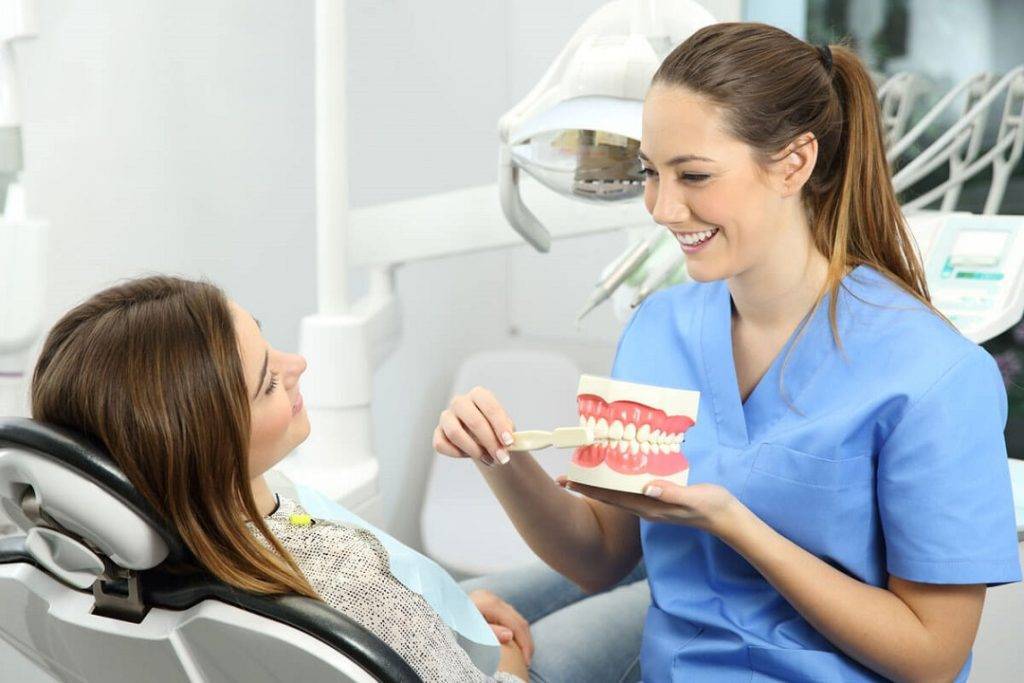Maintaining the hygiene of your teeth and gums requires regular oral health examinations. You should go to the dentist at least every 6 – 7 months, or as recommended by your dental professional.
What happens at a dental appointment?
A routine dental appointment is divided into two parts: a test/check-up and a cleaning/oral prophylaxis.
During your visit, your dentist will check for cavities. X-rays could detect cavities within the gaps. During the test, your teeth will be examined for plaque bacteria. Plaque is a transparent and sticky bacterial coating.
If it is not removed, it will harden and become tartar. Brushing and flossing are ineffective methods of tartar removal. Plaque and tartar accumulation on your teeth can lead to oral diseases.
The next step is to have your gums checked. A special instrument can be used to measure the gap between your teeth and gums. With clean gums, the gaps are shallow. Gum disease has the potential to widen the gaps.
During the test, your face, throat, tongue, neck, and head should all be thoroughly examined. This is done to look for any potential risk symptoms, such as swelling or cancer.
If you are considering skipping a dental check-ups due to cost or another factor such as availability or dental anxiety, make sure you consider all of the possible consequences.
Five of the most compelling reasons to consult the dentist on a regular basis are as follows:
1. Oral Cancer Diagnosis
Oral cancer is a very severe condition that can occur in a variety of ways. Oral cancer is often misdiagnosed due to a lack of awareness of early warning signs, and it can rapidly develop and then become life threatening. However, an oral diagnosis of cancer at an initial stages is always curable.
A VELscope- The cancer check is non-invasive, painless, and It is protected by MSP in some cases. The test detects untraceable signs of dead tissue due to tumours that develop through the mouth.
2. All about Tartar, Cavity and Plaque
Even for the most attentive frequent flosser and brushers, there are always specific places in the mouth where flossing and brushing did miss. Plaque becomes even more difficult to extract as it hardens and turns into tartar, which is exceedingly hard to extract without skilled assistance.
Tartar does not erode or produce small hole in teeth, that is how cavities form. Cleanings are much less expensive than fillings, so if you’re on a budget, don’t skip them!
3. Gum Related Diseases
Plaque and tartar accumulation will destroy the mouth’s gum tissues, causing tooth decay. This develops when tartar triggers an inflammation on the gum line, causing the gum to drift away from the tooth.
Gingivitis is an infection that causes the tissue that connects the gums to the teeth to start breaking down. It is technically gum disease when it reaches this stage, and there will almost certainly be inflammation, soreness, or bleeding in the mouth.
Routine dental cleanings are important in detecting and treating gingivitis until it gets out of control in order to prevent any of this.
4. Keeping Unhealthy Habits Under Control
There are a number of harmful practices that can affect your dental hygiene, some of which you might be unaware of. Munching ice, grinding the nails, twitching your jaws, grinding the mouth, consuming hard or gummy candy, clean your teeth very vigorously, smoking cigarettes and wine, and, of course, drinking coffee are all examples of these bad activities.
Your dentist will check for any oral harm caused by these or other practices that you might not be aware of, if you go for routine dental check – up. Knowing about particular unhealthy behaviours helps you to alter or adjust your lifestyle choices to avoid further harm.
5. Using X-Rays to identify issues under the surface
X-rays of your teeth and jaw bone are an essential aspect of consulting your dental professional every six months. X-ray scans allow dentists to see what’s going on under the surface of the mouth, allowing them to detect and implement solutions that aren’t apparent to the naked eye.
Significantly affected teeth, which are developing tooth that are prevented from pushing thru the gums, are a common occurrence in wisdom teeth.
Up-to-date x-rays and check-ups in every 6 months are the safest way to increase the quality of your health, particularly for destructive diseases that display minimal to no signs but progress rapidly. 
Finally,
Dental professionals and dentists are involved with more than just tooth repair. They rinse your mouth thoroughly, search for defects that might otherwise go overlooked and might be a symptom of greater medical conditions, and ensure that your teeth and gums are safe.
Dental practitioners, among several other measures, ensure that your bones are healthy and assist you in correcting any behaviors that might be attempting to sabotage your oral health.
It may not seem like missing dental visits is a serious matter, but dental problems can grow and progress rapidly, even if you aren’t aware of them. You’ll be doing yourself a huge favour in the long run if you keep up with your oral cleanings and check – ups.
Expert Opinion
Dr. Priyanka Shingore Dental Director of Sabka dentist says "Large dental problems can cause many painful experiences and expensive treatments. Dentists recommend routine dental check-ups for at least four months. A single visit for regular check-ups can avoid many dental health problems. Can help maintain oral health in good condition."










